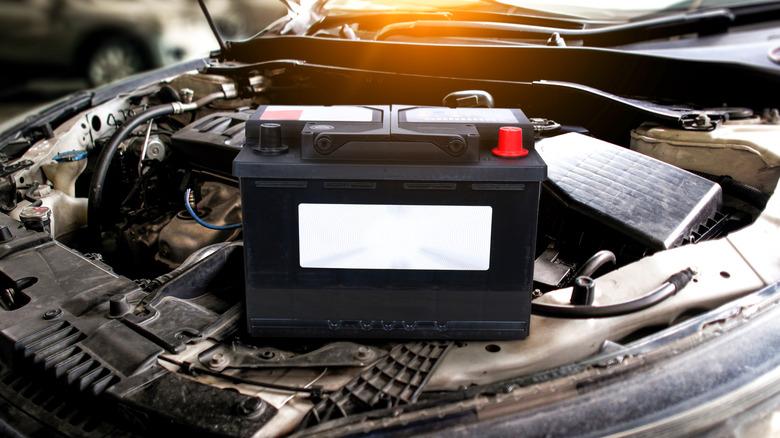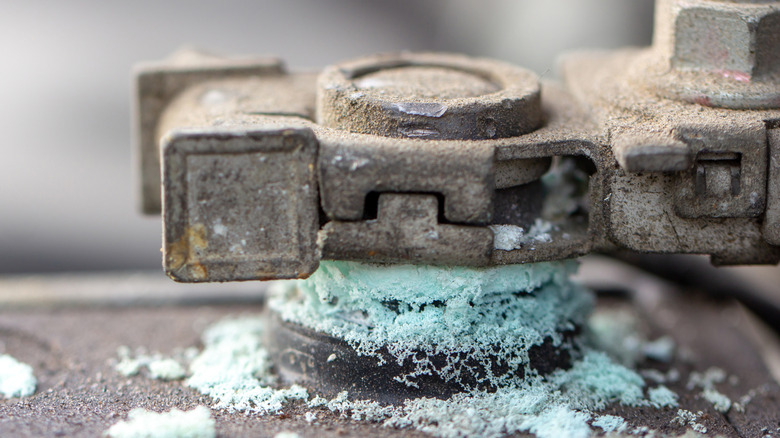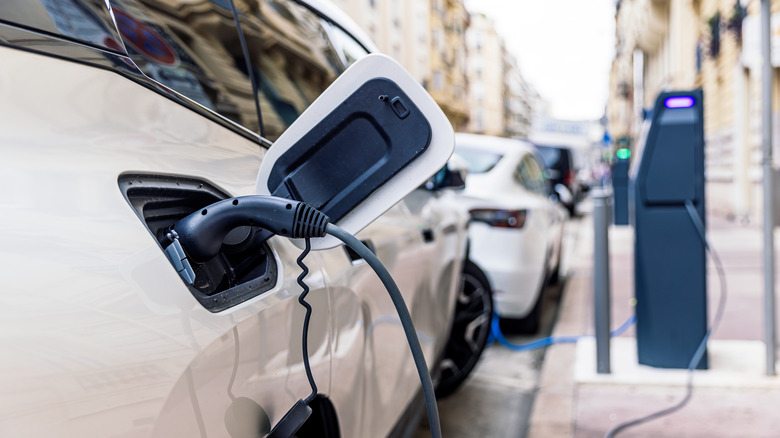Can Your Car Battery Shock You? What You Need To Know Before You Open The Hood
Car batteries are a necessity in the modern vehicle, doing more than powering your lights and radio. They play a vital role in getting your car up and running and remaining that way, allowing you to make all the trips you need. Unfortunately, they're not perfect, being prone to leakage and failure over time if used irresponsibly or not replaced in the recommended timeframe. Overall, the process of disconnecting your car battery isn't too involved, but it can be intimidating to those unaccustomed. There could even be some hesitation over where and what to touch — and the consequences of making the wrong choice.
As a component concerned with providing electrical current throughout the vehicle, one might worry that their car's lead-acid battery can shock them. In truth, a regular, intact car battery is incredibly unlikely to deliver any shock, much less one that could result in serious injury. This is due to the voltage level of car batteries, which typically hovers around the 12-volt area. For a human to be shocked, there needs to be a voltage somewhere around 50 volts on the low end. The only way you might remotely feel anything is if you touch the terminals with wet hands, as water increases conductivity, but this won't be more than a slight tingle. Otherwise, you don't have anything to worry about.
With all of that said, car batteries aren't entirely safe for anyone to flippantly handle. You need to be mindful of what you're doing, or else it could become a hazard.
Actual dangers car batteries can present
Though the likelihood of a car battery shocking you is incredibly low, you can still sustain serious injuries from one in other ways. For example, if a battery has begun to decay due to old age or has otherwise broken open, the materials within could leak out. This sulfuric acid shouldn't make contact with one's eyes or skin, or else chemical burns could ensue. They can take up to a few hours or even a day to manifest, leaving the individual affected with anything from minor skin irritation and itching to genuine burns and serious wounds. Treatment involves removing all clothing from the impacted areas, flushing the skin or eyes with cool running water for between 15 and 20 minutes, and air drying as soon as possible.
Also, there's the danger that can come from incorrectly trying to jump a dead battery. A key step in the jumping process is not to attach a negative jumper cable clamp to the negative dead battery terminal, as this can cause sparks at best or an explosion at worst. It goes without saying that either can lead to serious injuries, so remember to ground that clamp on a metal piece of the car, well away from the battery. Not only is this essential to your health and your vehicle, but it's also a crucial component of properly jumping a car battery.
Of course, most of the information covered here is specific to traditional lead-acid car batteries found in most vehicles. Meanwhile, electric vehicle batteries are an entirely different beast.
Odds of EV battery electrocution
These days, more electric vehicles are on the road than ever before. Some of the foremost automotive brands in the world have gotten in on these rides, testing the waters on non-fossil fuel-powered cars. As such, these vehicles rely on pretty powerful batteries to get from point A to point B. While a 12-volt, lead-acid battery is typically present in such vehicles, they don't work alone. EVs also tend to utilize lithium-ion battery packs that run between 400 and 800 volts, though there are slightly lower denominations for specific models.
With that in mind, making direct contact with an EV's power cables or getting caught in the crossfire of a short circuit could potentially result in death. Also, while not common, ruptured lithium-ion battery cells are capable of heating up and ultimately catching fire. Fortunately, most EVs are prepared for emergency situations, containing circuit breakers to cut off the flow of diverted electricity and self-isolating battery systems following accidents. Overall, EVs are just as safe to drive as gas-powered rides, and the notion that they're not is just one of many common electric car myths.
Regardless of the type of car you drive, the batteries themselves pose risks. Still, they're not as guaranteed a danger as one might think, and instances of harm are quite unlikely with standard, safe use.


